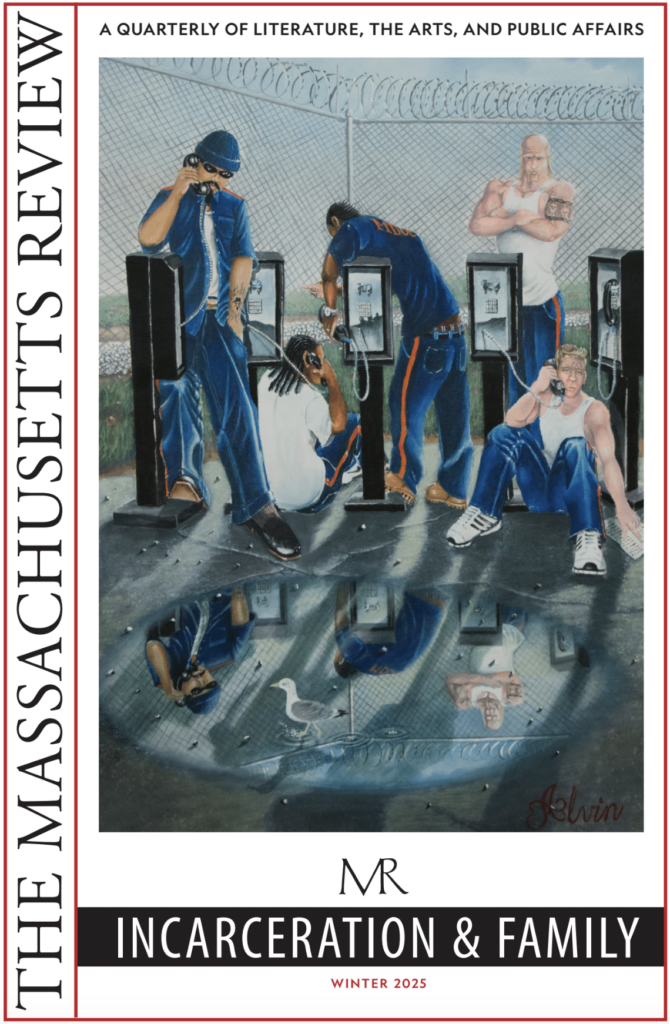A review of Uncanny Valley Girls: Essays on Horror, Survival, and Love (Harper Perennial 2025) by Zefyr Lisowski and Scream with Me: Horror Films and the Rise of American Feminism (1968-1980) (Atria 2025) by Eleanor Johnson. I used to think I didn’t like horror films, but then, thirteen years ago, I met . . .
About
Mission: In these uncertain times, the Massachusetts Review promotes social justice and equality, along with great art. Committed to aesthetic excellence as well as public engagement, MR publishes literature and art to provoke debate, inspire action, and expand our understanding of the world around us.
Founded in 1959 by a group of professors from the University of Massachusetts Amherst, Amherst College, Mount Holyoke, and Smith, the Massachusetts Review is one of the nation’s leading literary magazines, distinctive in joining the highest level of artistic concern with pressing public issues. As The New York Times observed, “It is amazing that so much significant writing on race and culture appears in one magazine.” MR was named one of the top ten literary journals in 2008 by the Boston Globe.
A 200-page quarterly of fiction, poetry, essays, and the visual arts by both emerging talents and established authors, including Pulitzer and Nobel prizewinners, special issues have covered women’s rights, civil rights, and Caribbean, Canadian, and Latin American literatures.
MR‘s history of significant criticism includes major work on W.E.B. Du Bois, James Baldwin, Henry David Thoreau, Nathaniel Hawthorne, and Grace Paley. An Egypt issue, published just after 9/11, focused on the social, national, religious, and ethnic concerns of that nation, and encouraged readers to look beyond stereotypes of terrorism and racism. As part of the run-up to its Fiftieth birthday, MR published a landmark issue on queer studies at the beginning of 2008 (Volume 49 Issue 1&2). Our special double issue for Fall/Winter 2011 was entitled “Casualty” and documented—in art, prose and poetry—the enduring cost of war.
Masthead
The Massachusetts Review is edited by a highly talented and diverse group of writers and teachers, centered in the Five Colleges area of Western Massachusetts and throughout the country. Our offices are at the University of Massachusetts in Amherst. For more information about the editors, please click their names.
To contact individual editors, write to the editorial office (NEW ADDRESS: Massachusetts Review, 400 Venture Way, Hadley, MA 01035) or email massrev@external.umass.edu.
Britt Rusert, Executive Editor
ART
Pam Glaven, Art Director
Mario Ontiveros, Art Editor
POETRY
Nathan McClain, Poetry Editor
Abigail Chabitnoy, Poetry Editor
PROSE
Francesca Bellei, Prose Editor
Asha Nadkarni, Prose Editor
Jemimah James Wei, Prose Editor
PUBLIC AFFAIRS
Shailja Patel, Multigenre Editor
Francesca Bellei, Prose Editor
TRANSLATION
Mona Kareem, Poetry-in-Translation Editor
Corine Tachtiris,Prose-in-Translation Editor
Jack Saebyok Jung,Translation Editor
PERFORMANCE
Dominic Taylor, Theater Editor
REVIEWS
Richie Wills, Reviews Editor
Michael Thurston, Poetry Reviews Editor
SUBMISSIONS READERS
Assemay Almazbekkyzy
Isabel Cruz
Corinne Demas
Mike Dockins
Robert Dow
Paige Passantino
Nate Pinkham
Mary Luna Robledo
Ide Thompson
STAFF
Emily Wojcik, Business Manager
Edward Clifford, Managing Editor
Franchesca Viaud, Assistant Editor
G. Ziegel, Editorial Assistant
Jules Chametzky, Founding Editor



